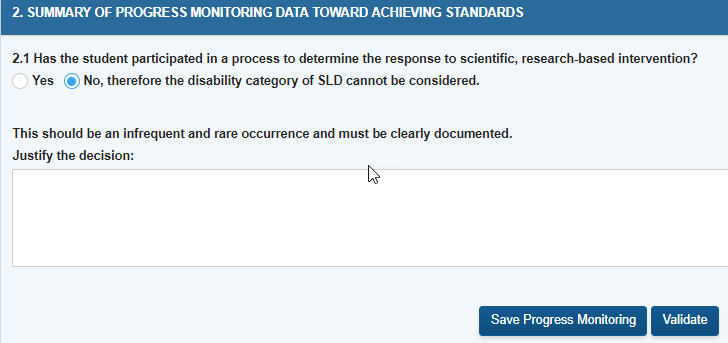Immediate Consideration

This question will only appear for initial eligibility reports:
The committee must review the information presented by the parents and school to determine if the information discussed warrants referral for immediate comprehensive special education evaluation and eligibility consideration AND no interventions have been completed prior to or during the evaluation process. GA CHILD FIND rules require that interventions should be provided, even in the case of parent referrals or community PK children. If interventions were not already in place, they should begin immediately at the time of the referral, therefore, in most cases the response to this question will be YES and the information for the intervention(s) provided prior to or during the evaluation process would be added.

When interventions have not been provided for an appropriate amount of time, the disability category of SLD cannot be considered. If your district has not provided interventions required by Child Find, this field can be used to document that in order to avoid further delay in evaluating for special education consideration. When this update is made, SLD will not show as a disability to be considered on Section VI of the eligibility report.
Part B regulations at 34 C.F.R. §300.301(b) allow a parent to request an initial evaluation at any time to determine if a child is a child with a disability under IDEA. As OSEP Memorandum 11-07 states, MTSS/RTI may not be used to delay or deny a full and individual evaluation under 34 C.F.R. §§300.304-300.311 for a child suspected of having a disability. With respect to preschool children, IDEA does not require or encourage a local or preschool program to use a MTSS approach prior to referral for evaluation or as part of determining whether a 3-, 4-, or 5-year-old is eligible for special education and related services. Once an LEA receives a referral from a preschool program, the LEA must initiate an evaluation process to determine if the child is a child with a disability. See: 34 C.F.R. §300.301(b).
NOTE:
A parental request for an evaluation in order to determine whether a student may have an educational disability is not sufficient reason for bypassing interventions. When this occurs, systems should use 60 days allotted prior to the eligibility meeting to implement interventions and monitor the results of those interventions. This information would be considered when making the eligibility decision. The system may use any evaluation results obtained previously if they are still considered to be valid, and any new information. A student whose grade is PreK should not bypass interventions based solely on his age or school enrollment status. Section b of the Georgia Child Find rule refers to ALL students. We are bound by both federal and state rules. Therefore, some intervention information for preschool aged students is expected. However, if that information was not obtained prior to the referral, the lack of intervention data cannot delay the evaluation and determination of eligibility. As a best practice, it is recommended that some intervention data is obtained during the evaluation period if nothing was obtained prior to the referral. .
Section from Georgia Implementation Manual- Child Find Chapter:
Child Find is a critical part of the special education process for all children suspected of having disabilities. IDEA requires that children who are suspected of being a child with a disability and in need of special education are identified, located, and evaluated. 34 C.F.R. § 300.111. IDEA does not require that a child receive scientific, research, or evidence-based interventions before being referred for consideration for eligibility for special education and related services. See 34 C.F.R. § 300.111. However, per our State Child Find Rule, the implementation of a multi-tiered system of supports, including the use of scientific, research, or evidence-based interventions are required before referring a child for an initial evaluation for special education. See Georgia Rule 160-4-7-.03(2)(b). The use of interventions before referring a child for an initial evaluation for special education can have a positive impact on reducing the disproportionate representation of racial and ethnic groups in special education and related services. In addition, if a parent or teacher requests an evaluation and interventions have not been provided prior to the referral, interventions may be provided while the child is being evaluated (within the 60-day timeline requirement). Although a child’s receipt of interventions can provide a critical piece of information in helping to determine eligibility for special education, the lack of interventions must not be a reason for determining that a child is not eligible for special education services.